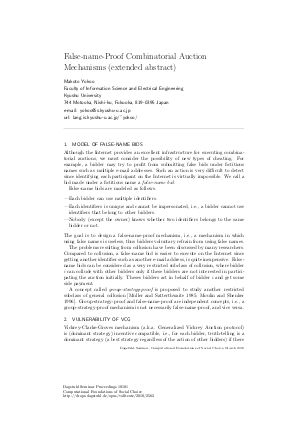False-name-Proof Combinatorial Auction Mechanisms
Author Makoto Yokoo
-
Part of:
Volume:
Dagstuhl Seminar Proceedings, Volume 10101
Part of: Series: Dagstuhl Seminar Proceedings (DagSemProc) - License:
 Creative Commons Attribution 4.0 International license
Creative Commons Attribution 4.0 International license
- Publication Date: 2010-05-20
File

PDF
DagSemProc.10101.3.pdf
- Filesize: 94 kB
- 4 pages
Document Identifiers
Subject Classification
Keywords
- Combinatorial auctions
- mechanism design
- false-name bids
Metrics
- Access Statistics
-
Total Accesses (updated on a weekly basis)
0PDF Downloads0Metadata Views
Abstract
In Internet auctions, it is easy for a bidder to submit multiple bids
under multiple identifiers (e.g., multiple e-mail addresses).
If only one good is sold, a bidder cannot make any additional profit by using multiple bids. However, in combinatorial auctions, where multiple
goods are sold simultaneously, submitting multiple bids under fictitious names can be profitable. A bid made under a fictitious name is called a {em false-name bid}. In this talk, I describe the summary of existing works and open problems
on false-name bids.
Cite As Get BibTex
Makoto Yokoo. False-name-Proof Combinatorial Auction Mechanisms. In Computational Foundations of Social Choice. Dagstuhl Seminar Proceedings, Volume 10101, pp. 1-4, Schloss Dagstuhl – Leibniz-Zentrum für Informatik (2010)
https://doi.org/10.4230/DagSemProc.10101.3
BibTex
@InProceedings{yokoo:DagSemProc.10101.3,
author = {Yokoo, Makoto},
title = {{False-name-Proof Combinatorial Auction Mechanisms}},
booktitle = {Computational Foundations of Social Choice},
pages = {1--4},
series = {Dagstuhl Seminar Proceedings (DagSemProc)},
ISSN = {1862-4405},
year = {2010},
volume = {10101},
editor = {Felix Brandt and Vincent Conitzer and Lane A. Hemaspaandra and Jean-Francois Laslier and William S. Zwicker},
publisher = {Schloss Dagstuhl -- Leibniz-Zentrum f{\"u}r Informatik},
address = {Dagstuhl, Germany},
URL = {https://drops.dagstuhl.de/entities/document/10.4230/DagSemProc.10101.3},
URN = {urn:nbn:de:0030-drops-25621},
doi = {10.4230/DagSemProc.10101.3},
annote = {Keywords: Combinatorial auctions, mechanism design, false-name bids}
}
